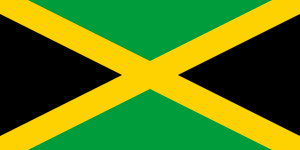Crime in Jamaica
Some areas of Jamaica, particularly cities such as Kingston, Montego Bay and Spanish Town, experience high levels of crime and violence.[1] Jamaica has had one of the highest murder rates in the world for many years, according to United Nations estimates.[2] Former Prime Minister P. J. Patterson described the situation as "a national challenge of unprecedented proportions".[3]
Murder rate
When Jamaica gained independence in 1962, the murder rate was 3.9 per 100,000 inhabitants, one of the lowest in the world.[4] In 2005, Jamaica had 1674 murders for a murder rate of 58 per 100,000 people.[5] That year, Jamaica had the highest murder rate in the world.[2] In November 2008, the Jamaican Parliament voted to retain the death penalty, which is performed by hanging.[6]
There were 1,682 reported murders in 2009 and 1,428 in 2010. Since 2011 the murder rate has continued to fall following the downward trend started in 2010, with increases in police patrols, curfews and more effective anti-gang activities.[7] In 2012, the Ministry of National Security reported a 30 percent decrease in murders.[8] Many of the murders in Jamaica are connected to organized crime in the country's urban centers; and most of this organized crime involves the illegal drug trade.
Violence against homosexuals
The U.S. Department of State reported that brutality with homosexuals, mainly by private citizens, was widespread in 2008.[9] Homosexuality per se is not illegal in Jamaica; however the Offenses Against the Person Act criminalizes buggery (anal sex) as well as "acts of gross indecency" between men. Many Jamaicans are hostile toward LGBT and intersex people, and several mob attacks against gay people have been reported.[10][11][12] International human rights groups, the local LGBT rights organization, Jamaica Forum for Lesbians All-Sexual and Gays (JFLAG) and many Jamaicans have called on the government to take measures to protect LGBT people, including repealing the buggery law. [13][14][15]
See also
References
- ↑ "North and Central America and Caribbean Jamaica". Travel advice by country. United Kingdom, Foreign & Commonwealth Office. 2009-03-20. Retrieved 2009-03-20.
- 1 2 "Nationmaster Crime Stats". .com. Retrieved 2009-07-04.
- ↑ "Washington Post Foreign Service". Nisat.org. Retrieved 2009-07-04.
- ↑ http://www.focal.ca/en/publications/focalpoint/307-september-2010-don-robotham
- ↑ "Crime, violence and development: trends, costs, and policy options in the Caribbean" (PDF). United Nations Office on Drugs and Crime. p. 37. Retrieved 2007-12-26.
- ↑ "Jamaica votes for death penalty". BBC. 2008-11-25. Retrieved 2009-06-04.
- ↑ "Prime Minister Golding Speaks on Crime Reduction".
- ↑ Pachico, Elyssa (2012-3-30). "Jamaica Murder Rate Dropped 30% in 2012". InSightCrime: Organized Crime in the Americas. Retrieved 2012-12-1.
- ↑ "2008 Country Reports on Human Rights Practices, 2008 Human Rights Report: Jamaica". United States, Department of State, Bureau of Democracy, Human Rights, and Labor. 2009-02-25. Retrieved 2009-03-19.
- ↑ . Lacey, Marc (2008-02-24). "Attacks Show Easygoing Jamaica Is Dire Place for Gays". New York Times. Retrieved 2009-03-19.
- ↑ "Jamaica: Shield Gays from Mob Attacks". Human Rights Watch. 2008-01-31. Retrieved 2009-03-19.
- ↑ "Document - Jamaica: Amnesty International condemns homophobic violence" (Press release). Amnesty International. 2007-04-15. Retrieved 2009-03-19.
- ↑ Padgett, Tim (2006-05-12). "The Most Homophobic Place on Earth?". Time Magazine. Retrieved 2009-11-26.
- ↑ Henry, Paul (2013-6-26) Court to Hear Motion Challenging Buggery Law Today. The Jamaica Observer. Retrieved 2013-6-26.
- ↑ Blanket Anti-Buggery Law is Archaic (2013-7-3). The Jamaica Observer. Retrieved 2013-7-2.

